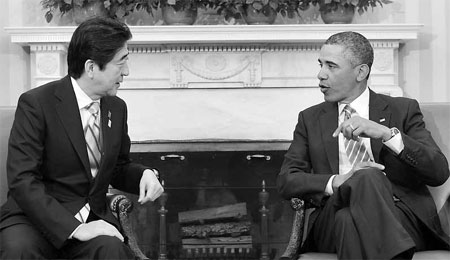Abe courts Obama support
Updated: 2013-02-24 08:27
By Chen Weihua in Washington and Zhang Yunbi in Beijing(China Daily)
|
|||||||||
|
US President Barack Obama (right) converses with visiting Japanese Prime Minister Shinzo Abe after their formal meeting on security and economic issues at the White House on Friday. Jewel Samad / Agence France-Presse |
Washington was cautious in its responses at a US-Japan summit as leaders discussed China-related issues, including the Diaoyu Islands dispute, during Japanese Prime Minister Shinzo Abe's meeting with US President Barack Obama.
Abe landed in Washington on Thursday and met Obama and other officials on Friday, seeking a clear statement of support from US leaders in the territorial dispute in the East China Sea.
While meeting the press after discussing a range of security issues with Abe in the Oval Office on Friday morning, Obama did not even mention China or the tension over the disputed islands. Instead, he only expressed the importance of a US-Japanese alliance.
"Japan is one of our closest allies and the US-Japan alliance is the central foundation for our regional security and for much what we do in the Asia-Pacific region," Obama said.
After Abe, the fifth Japanese prime minister in office since Obama became president in 2009, answered the question from a Japanese reporter about the islands, Obama declined to elaborate on the issue but signaled an end to the press briefing.
Zhou Yongsheng, a professor of Japanese studies at China Foreign Affairs University in Beijing, said Abe "has not harvested" what he had wanted from the meeting.
"Washington is still in a holding pattern and sitting tight in this regard, and its call for Tokyo to calmly respond to the islands situation has shown its desire not to further escalate the feud," Zhou said.
The joint statement by the US and Japan, released by the White House, only mentioned the issue of Japan's participation in the Trans-Pacific Partnership, a free-trade pact Tokyo would like to join.
Japan's Kyodo News Agency, describing the gist of the Obama-Abe talks, said only that Abe and Obama agreed to "seek peace, stability in the East China Sea".
The US-Japan summit came a day after China expressed strong dissatisfaction over Abe's remarks on China, made in an interview with the Washington Post before he embarked on the US trip. Japanese officials said later that the Post story, in which Abe was quoted as saying that the Chinese Communist Party had a "deeply ingrained" need to spar with Japan and other Asian neighbors over territory, was "misleading" and misunderstood.
Tao Wenzhao, a senior expert on US studies at the Chinese Academy of Social Sciences, said Tokyo is now apparently seeking more support from Washington in regard to the Diaoyu Islands dispute as the standoff with Beijing lingers.
However, "the US has shown a self-contradictory stance on the dispute," Tao said. Washington has said it does not take a position on the dispute while also saying the islands fall within the scope of a 1960 US-Japan mutual security treaty, he noted.
The Obama administration has been careful over official statements after the Chinese government protested a statement last month by then-Secretary of State Hillary Clinton when she expressed opposition to "any unilateral actions that would seek to undermine Japanese administration" over the islands.
Jonathan Pollack, a senior fellow and director of the John L. Thornton China Center at Brookings Institution, said he does not think that Obama wants to do anything to aggravate the situation.
"He (Obama) understands what he said will be followed very closely not just by China, but by others as well," said Pollack.
"He wants to reaffirm his interest to see tension reduced, find a way the two sides can deal with each other face-to-face in a realistic way. I don't think he is trying to intervene in this. The last thing the US wants or needs is a new confrontation or conflict there," he said.
Abe said he told Obama that Tokyo would handle the islands issue "in a calm manner".
While giving a speech "Japan Is Back" at the Center for Strategic and International Studies Friday afternoon, Abe said: "No nation should make any miscalculation about firmness of our resolve. No one should ever doubt the robustness of the Japan-US alliance."
However, Abe added that he has absolutely no intention to deepen the dispute.
While their talks focused on security and the alliance, Obama and Abe also discussed economic and trade issues, including the potential for Japan to join the Trans-Pacific Partnership, a free-trade agreement that does not include China and India.
Japan's intention to join TPP has been strongly opposed by its politically powerful farmers, especially rice producers, who believe removing tariffs will destroy their industry.
Meanwhile, many US manufacturers, such as the auto industry, continue to push for Japan to open its market further and refrain from weakening the yen, an important element of the so-called "Abenomics", a set of economic policies put forward by Abe.
Relations between the US and Japan were strained under the previous Japanese Democratic Party government amid a row over the relocation of a US military base at Okinawa.
Abe initially requested a visit to the United States in January, but was rejected by the White House, citing Obama's busy agenda with the inauguration and the State of the Union address. The trip was later scheduled for February.
Contact the writers at chenweihua@chinadailyusa.com and zhangyunbi@chinadaily.com.cn.
(China Daily 02/24/2013 page2)
